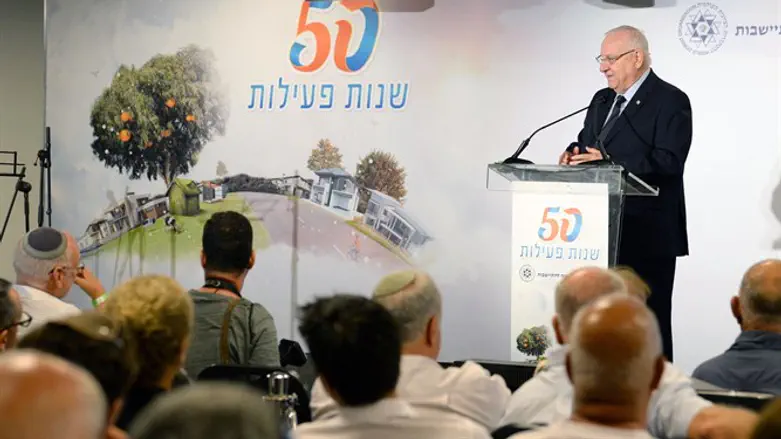
President Reuven Rivlin took part Tuesday in a ceremony marking the 50th anniversary of the World Zionist Organization's Settlement Division at the Tel Aviv Fairgrounds, together with Minister of Agriculture Minster Uri Ariel and WZO Chairman Avraham Duvdevani.
At the beginning of his speech, the president quoted a description of the Land of Israel from 1868 written by renowned author Mark Twain, in which he called the land as barren and lifeless: "Exactly one hundred and fifty years after Twain's dark description, and our Land of Israel is beautiful and flourishing, and in the Jewish, democratic, We have proven that settlement is also flourishing, everywhere and for every human being."
"The settlement connects the right and the left, it includes kibbutzim of Hashomer Hatzair alongside the settlements of Amna, veteran moshavim alongside cities and towns," he said.
The president added, "My brothers the settlers, the State of Israel owes you a real debt, and when the enemy looks at us, he sees the strength of settlement, our ability to stand up, all the candidates and interested parties, the new generation and the young generation that grew up in teir home. We returned home, and from here we will not move again."
"It's not easy to live by the fence, not far from the yard of your home in the Shtula, on the northern border, with fighters controlled by Iran. It's not that simple, but the settlement succeeds, and you'll go around this fair and see for yourself," Rivlin concluded.
Prime Minister Binyamin Netanyahu sent a letter of congratulations to the heads of the brigade in which he wrote: "In the past 50 years, the Settlement Division has been one of the most important branches of the Israeli government in this field."
The head of the Settlement Division, Gael Greenwald, said, "In 2018 there is a need to strengthen the borders and preserve national lands, and in 2018 we also want to offer the general public a different living experience."
The Settlement Division for decades operated in both the Israeli periphery and in Judea and Samaria, providing for the physical construction of communities and social support.